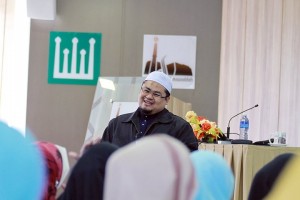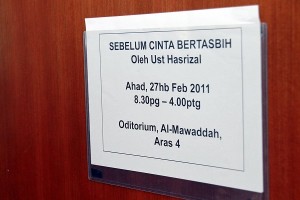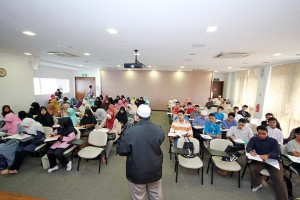Sunday mornings would usually find me still tucked in bed at the hours of 8am. But last Sunday 27th February 2011, I was a changed person. Not only had I showered but I had ironed my clothes and gotten ready by 7am. There was one reason and one reason only: I had signed up for the seminar “Sebelum Cinta Bertasbih” by the popular ‘Ustaz Cinta’, Ustaz Hasrizal of SaifulIslam.com.
In all honesty, the content wasn’t the bait that attracted me. I had been following his blog for about 3 years now and needless to say, if you were loyal to a blog for 3 years, you must really like the things you read there. He had come to Singapore several times before but it always seemed to clash with my schedule. This time, I decided that I had to forgo my Sunday sleep-in to finally hear him speak in person. And boy, was I glad Allah granted me the opportunity to be in that auditorium at Al-Mawaddah Mosque in Sengkang!
If you enjoy his blog, and his books (I bought “Aku Terima Nikahnya” and loved it. He also has other books you can check out here) then you would definitely love to attend his programs. Like his writings, he is witty, smart and manages to explain the toughest of concepts into the simplest analogies and stories.
One of my favourite analogies that he made that day was the similitude of committing ‘small’ sins and ‘big sins’. He had asked the audience: “How many people in Singapore have been eaten alive by a tiger in the past year?” The answer was probably 1. He then asked: “Now how many have met their fatal end because of a mosquito’s bite in the past year?” Surely the numbers were much more due to dengue and other mosquito-related diseases. To this he said that the mosquito is a sign from Allah to never underestimate the small, and this includes sinning. It may be a ‘small’ sin in our eyes but our judgement does not matter in front of The Ultimate Judge.
Moreover, (and he gave another profound analogy here) it is perfectly alright for him to twist his son’s ear if he misbehaves, but attempt to do that to his father, or the minister, or to the president of a country and the repercussions becomes greater and graver. Here, even though the act is similar, the recipients are not. Ustaz Hasrizal then gave his signature punchline: “Who is Allah? Who are we sinning against?” SubhanAllah!
In that same way, he conducted the rest of the seminar, and time seemed to pass too fast. There were too many stories and similitudes that he gave, and he definitely caused the participants to erupt in laughter countless times.
While I may not be able to share everything I had learnt (come on, it was a full day seminar!), I will try to share the most poignant of the lot.
Syariatullah and Sunnatullah
Possibly one of the things I’m most grateful to Ustaz Hasrizal was his elucidation of the necessity of both Syariatullah & Sunnatullah. The former is what we’re most likely familiar with – the halal & haram, the right way to do things etc. Sunnatullah is the law of nature.
While Ustaz had written the story on his blog before, I shall attempt to summarize it in English here:
Pak Haji is a God-fearing man who prays nawafil, has gone to Hajj, fasts and pays his zakat. On the other hand, there is Ah Chong who does not believe in God, gambles, commits sins and sleeps around. They both intend to plant corn.
Pak Haji chooses a location that is next to the mosque and one that faces the direction of prayer (kiblah). Ah Chong’s plantation is next to a pigsty and to the left of the village. In our understanding, there is no barakah or blessings in Ah Chong’s choice of location.
Each morning, Pak Haji goes out to his plantation at 10am after he has prayed the dhuha prayer and has supplicated to Allah for the success of his plantation. He says “Bismillah” before putting in each seed and then heads home at 1130am to prepare for zuhur prayer.
Ah Chong wakes up at 7am, does not seek God’s blessings, reads the “How To Plant Corn” manual, chooses the best seeds, and only reaches home at 1pm.
Amongst the two, despite Pak Haji’s piety, it is Ah Chong’s plantation that grows and harvests the best corn. This is not to negate or undermine the value of barakah and reliance on Allah, no. This is to show that there is a two-pronged approach to things. First is the adherence to Syariah, such as praying to Allah for the success etc. But we cannot neglect the Sunnatullah or law of nature. Allah has decreed that the ideal conditions for corn to grow is to choose the best seeds, to measure the distance between each seed etc. Only when we fulfill both conditions would we achieve not only the greatest harvest but Allah’s pleasure too.
This balance and absolute necessity of the Syariah and the Sunnah of Allah is a concept that would put us in good stead as we maneuver through this life, for every circumstance and aspect. Giving the best effort for this world, while protecting the demands of Allah upon us.
In the same vein, Ustaz Hasrizal mentions the necessity of both in a marriage. A good and successful marriage needs the spouses to not just pray jemaah together, fast together and be the most pious of people. It also needs other skills such as communication, intimacy and being romantic. Although all these can be found in the life of our Prophet Muhammad, upon him be peace, we are more exposed to the hard and fast rules (the praying and fasting) than the softer and more romantic side of our Prophet.

Lastly, Ustaz Hasrizal constantly mentions the need for taqwa and how it would be a guiding tool for us. Here I shall include the quote he had shared in our course folder:
It was reported that Sayyidina Umar ibn al-Khattab asked Sayyidina Ubayy bin Ka’b about taqwa.
Sayyidina Ubayy asked, “Have you ever walked on a path full of thorns?”Sayyidina Umar replied, “Yes.”
“What did you do then?”
“I rolled up my sleeves and treaded carefully.”
“That is taqwa.”
As we can see, taqwa is about having a good level of consciousness and self-control, constantly being aware of the dangers and avoiding them, as opposed to living life without reflection nor care of consequences.
May Allah reward Ustaz Hasrizal for all his efforts, and grant us all taqwa. Ameen!
Note: Photos are courtesy of Masjid Mawaddah. For other event photos, do check out Al-Mawaddah’s Mosque Facebook page.











My son attended this. Initially he asked me why send him for such seminar. He felt awkward during the registration as he was among the youngest participants.
For someone who always resist going for such event, he came back and can’t stop talking about what the Ustaz shared. With all the examples given and Ustaz way of reaching to his audience my son has learnt a lot from it.
My answer to my son’s question, given the things that our youngsters are exposed to, its never too young for him to learn the Islamic framework on dating and marriage. I’m glad that I send him for this seminar.